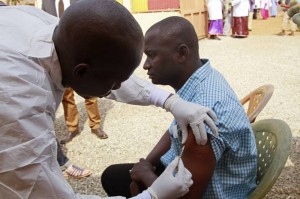from The Wall Street Journal,
5/26/17:
A new outbreak shows that despite the hard lessons of 2014, more needs to be done.

The deadly Ebola virus is back, and the world is responding more aggressively this time. But it’s still not as prepared as it needs to be to thwart deadly infectious disease threats, despite the hard lessons of the last epidemic.
The current outbreak in the Democratic Republic of the Congo is the first since 2014-16, when at least 28,600 people were infected in West Africa, including 11,310 who died—by far the largest Ebola outbreak in history.
Multiple reports in the aftermath of that epidemic called for major overhauls in global health financing and in the World Health Organization—which shouldered most of the blame for a delayed response that allowed it to spiral out of control.
Clear improvements are evident in the response to the current outbreak in Congo, where authorities have identified 49 potential cases, most of which are still under investigation. The WHO has created new emergency response rules and programs since the West African epidemic. Together with Congo’s ministry of health, the organization leapt into action as soon it learned of a cluster of people who had died of telltale symptoms in a remote northern region of the country. The two agencies sent out alerts and deployed teams of disease investigators to the area, parts of which can be reached only by riding on motorbikes through the forest.
A fast response isn’t entirely surprising in Congo, whose government is used to dealing with Ebola. It has had eight known outbreaks—more than any other country. The latest isn’t far from the Ebola River, after which the virus was named in 1976.
There is even a vaccine now for Ebola. Its maker, Merck, has produced 500,000 doses, and the international vaccine alliance GAVI is ready to ship doses to the outbreak, under an agreement struck last year with Merck. Equipment to ship and store the vaccine is being put in place in Congo, and the vaccine could be made available within a few days, says Seth Berkley, GAVI’s CEO.
As of late this week, however, the vaccine had not been deployed. Because it is not yet licensed, it may be administered only under the auspices of a clinical study, which must be approved by officials in any country where it will be used, according to the WHO.
In the end, the latest outbreak in Congo may peter out with a handful of cases. Only two have been confirmed with Ebola, and at least three more who died likely had the disease. Still, it took more than two weeks for word of the outbreak to make its way to health authorities who could muster the means to stop it—a tragic reminder of how dangerous microbes thrive in places with poor health systems.
Tedros Adhanom Ghebreyesus of Ethiopia, Dr. Tedros, as he is known, praises Congo and the WHO for acting quickly once they learned of the outbreak. “It’s a good sign,” he says. But more must be done to implement the lessons of Ebola in West Africa, he says. New threats are emerging all the time. “We have learned well,” he says. “But it’s not enough.”
More From The Wall Street Journal (subscription required):












